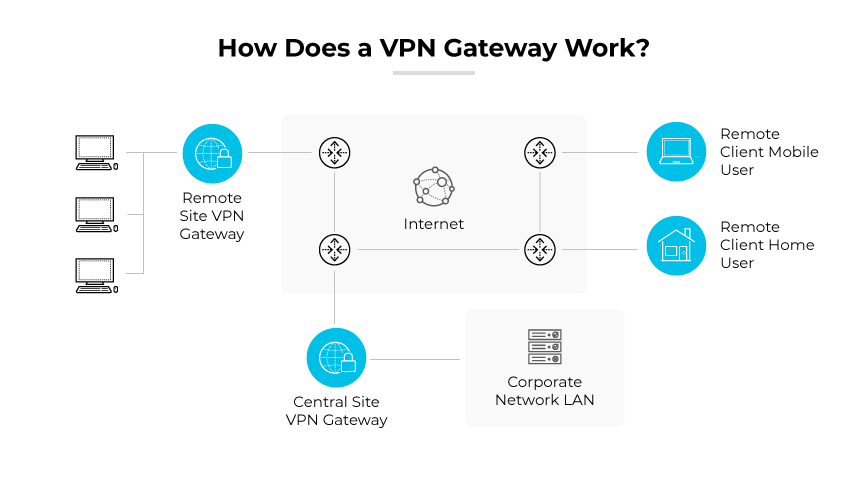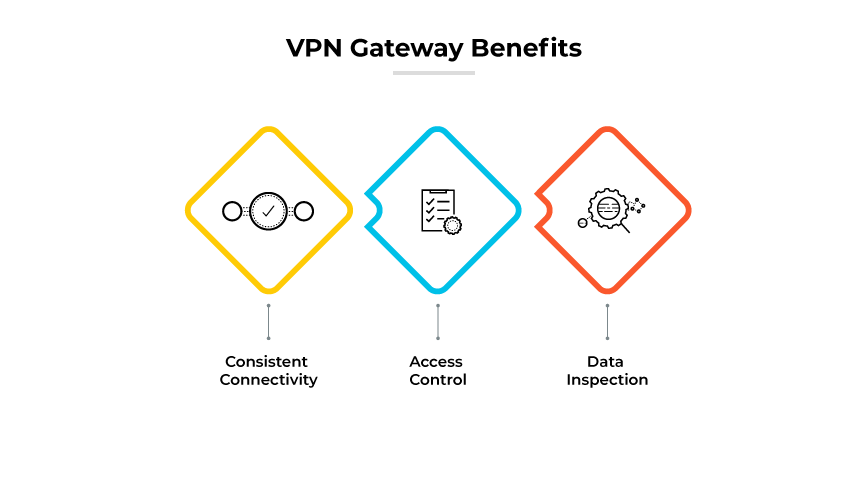What Is a VPN Gateway?
A VPN gateway is a network device that enables encrypted communication between different networks over the internet, serving as the central point in a virtual private network.
VPN gateways can connect multiple networks, ranging from on-premises sites to virtual private clouds, facilitating the secure exchange of information over the internet. When establishing multiple connections through the same gateway, the bandwidth is shared among all VPN tunnels.
How Does a VPN Gateway Work?

A virtual private network (VPN) gateway functions as a bridge to connect private networks to public networks. It establishes and secures a VPN connection, or tunnel, between the sender and receiver of data. Tunneling is achieved through various VPN protocols, including OpenVPN, IPsec, and Internet Key Exchange (IKE)/IKEv2. Each protocol offers distinct features for connection speed and encryption levels.
Authentication is a fundamental virtual private network gateway component. Before a user can access the private network, they must prove their identity. Methods of authentication range from trusted certificates on the user's device to inputting credentials in a client application. Enhanced security measures, like two-factor authentication, might be used for added protection.
In addition to authentication, a VPN gateway assigns an IP address, often static, that uniquely identifies the gateway. The IP address is crucial for tasks like IP whitelisting and facilitating remote access. VPN gateways manage DNS resolution to direct traffic over the internet. Some advanced models incorporate DNS filtering to safeguard against threats like phishing and malware. Another key role is access control, where user access rights are defined and granted, minimizing potential cybersecurity risks.
VPN Gateway Benefits

VPN gateways are relevant for businesses because they provide secure access to company resources from remote locations. They facilitate encrypted connections between a company's private network and remote users or sites, ensuring data security and integrity. This allows employees to work safely from anywhere, supports secure interoffice communications, and protects sensitive business data from eavesdropping or interception over public networks.
Consistent Connectivity
Employing the hot-standby architecture ensures the virtual private network gateway provides continuous service, even in the event of disruptions. This architecture ensures rapid failover and uninterrupted data transfer.
Access Control
Network access control allows for specific user permissions, ensuring only authorized individuals can access particular resources. This adds an additional layer of security and ensures data integrity.
Data Inspection
Deep packet inspection allows for a comprehensive review of data transmitted across a network. Inspection can lead to actions like blocking specific ports or protocols to enhance security.
VPN Gateway Disadvantages
With the rise of SASE (secure access service edge) and SD-WAN (software-defined wide area network) technologies which often include VPN technology in addition to a host of other security features, traditional virtual private network gateways can face certain disadvantages in comparison.
Complexity
Traditional VPN gateways often require intricate setup and manual configuration, which can be cumbersome and time-consuming, especially for large networks with many remote users or branch offices.
Scalability Limitations
While virtual private network gateways allow for secure connections, they may struggle to scale smoothly due to their dependence on hardware and static configurations, unlike SD-WAN, which is designed for easy expansion across vast networks.
Performance Problems
VPN gateways generally lack the advanced traffic optimization and application-aware routing that SD-WAN solutions provide, potentially leading to less efficient data flow.
Less Visibility and Control
Compared to SASE's cloud-native structure, traditional VPN gateways may offer limited visibility and control over network traffic and user activity, restricting detailed oversight.
Basic Security Features
SASE integrates various network security functions with WAN capabilities to meet dynamic access needs, while VPN gateways typically focus on secure access without the breadth of integrated security features.
Latency
Traditional VPN gateways can introduce latency by routing traffic through centralized data centers, a drawback for cloud applications, whereas SASE and SD-WAN technologies can leverage cloud gateways to minimize this issue.
Cost Ineffectiveness
Operating and expanding traditional VPN gateway infrastructure is generally not cost-effective. It can incur higher expenses compared to the adoption of cloud-native SASE solutions, which often have lower overheads.
Isolation
While VPN gateways can act as standalone solutions that may require complex integrations with other security systems, SASE provides a comprehensive and cohesive set of security tools.
Less Flexibility and Cloud Readiness
Traditional VPN gateways typically offer less flexibility in adjusting to various connection types and may not be as readily equipped for cloud environments, requiring additional measures for cloud optimization, unlike the inherently cloud-optimized nature of SD-WAN and SASE solutions.
VPN Gateway Use Cases
Site-to-Site Connectivity
VPN gateways facilitate secure encrypted connections between different geographical locations of a business, such as connecting various branch offices to the main corporate network.
Remote Access
A point-to-site VPN connects individual devices to corporate networks via secure connections over the internet, often using VPN gateways as the access points.
They provide secure access to the corporate network by connecting remote workers, ensuring that employees can access internal resources from outside the corporate environment with the same level of security as if they were on-site.
Network Extension
VPN gateways extend a corporate network through encapsulated and encrypted tunnels over the public internet, allowing the network to span multiple sites over a large geographical area.